Scientific News
Is feeling young good for the brain?
 Sure, we all age. But each of us perceives the passing years very differently. For example, are you one of those people who feels younger than their age? If you are, the “rejuvenation” you feel could be beneficial to your brain. For the first time, a South Korean study has highlighted the link between our subjective age and brain aging. Does feeling younger than we really are support cognitive health?
Sure, we all age. But each of us perceives the passing years very differently. For example, are you one of those people who feels younger than their age? If you are, the “rejuvenation” you feel could be beneficial to your brain. For the first time, a South Korean study has highlighted the link between our subjective age and brain aging. Does feeling younger than we really are support cognitive health? Why do some people feel younger or older than their real age? This is the question behind the research conducted by a team of scientists from the departments of psychology and sociology at the National Universities of Seoul and Yonsei in South Korea. The age we feel, or our ...
Are social ties the keys to cognitive health?
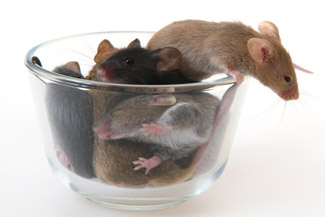 Having a large social network is one of the factors that may contribute to a healthy brain. But the benefits of maintaining or expanding social connections hasn’t received much research attention. One study has recently done just this by examining these ties between our social network and cognitive health. While it focuses on mice, it may still offer interesting information on one of the possible keys to brain health in humans.
Having a large social network is one of the factors that may contribute to a healthy brain. But the benefits of maintaining or expanding social connections hasn’t received much research attention. One study has recently done just this by examining these ties between our social network and cognitive health. While it focuses on mice, it may still offer interesting information on one of the possible keys to brain health in humans. Few animal studies have looked into the potential neuroprotective effects of a social network. Moreover, the little research that does exist mostly compares socially isolated animals to those living in groups. Until now, in both rodents and humans, ...
Can animals mentally replay past events?
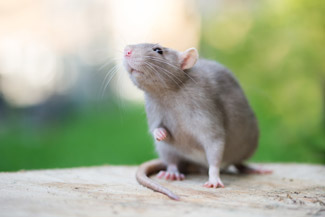 It’s the end of the day: you’re going home, but when you’re about to open the front door, you can't find your keys! Don’t worry, thanks to your episodic memory, you’ll be able to recall all of the specific events you experienced today. And by going back in time, you'll eventually find your keys and return home. We humans are indeed able to replay past episodes from our lives. But what about animals? Research has revealed that rats also share this ability.
It’s the end of the day: you’re going home, but when you’re about to open the front door, you can't find your keys! Don’t worry, thanks to your episodic memory, you’ll be able to recall all of the specific events you experienced today. And by going back in time, you'll eventually find your keys and return home. We humans are indeed able to replay past episodes from our lives. But what about animals? Research has revealed that rats also share this ability. As you know, memory comes in many forms, and our episodic memory allows us to mentally travel in time; our episodic memories are characterized by the repetition of several unique events in sequential order. And the ...
Is our brain like a bee colony?
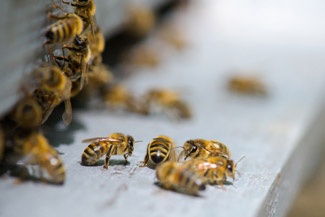 Besides the need to protect them because they play a fundamental role in pollination (which is essential to the survival of many plant and animal species), bees can tell us a lot about how our brains work. A research team from Sheffield studied their behavior and discovered analogies to the way our neurons interact during the decision-making process. How can a colony of bees be related to the human brain?
Besides the need to protect them because they play a fundamental role in pollination (which is essential to the survival of many plant and animal species), bees can tell us a lot about how our brains work. A research team from Sheffield studied their behavior and discovered analogies to the way our neurons interact during the decision-making process. How can a colony of bees be related to the human brain?A colony of honeybees works as a whole; each of its members depends on the others for survival. This specificity, also found in ants, intrigued scientists, especially those interested in psychophysics. This science studies the links between physical stimuli and the resulting ...
Does working on the top floor of a building increase risk-taking?
 Tell me which floor your office is on and I’ll tell you how risky your investment proposal is! While we might prefer otherwise, we all know that investment and legal decisions aren't always completely objective, especially because they are linked to the personalities of the actors involved. And a new and unexpected factor has just been unveiled in a study published in the Journal of Consumer Psychology: the altitude at which we make a financial decision. Let’s see the full details.
Tell me which floor your office is on and I’ll tell you how risky your investment proposal is! While we might prefer otherwise, we all know that investment and legal decisions aren't always completely objective, especially because they are linked to the personalities of the actors involved. And a new and unexpected factor has just been unveiled in a study published in the Journal of Consumer Psychology: the altitude at which we make a financial decision. Let’s see the full details. The research team led by Sina Esteky, an assistant professor of marketing at Miami University’s business school, first looked at data from more than 3,000 hedge funds from 2013 (500 ...
Can virtual reality improve learning?
 Welcome to the virtual palace of memory. In this special place, you may meet Michael Jackson, Napoleon Bonaparte, Donald Duck or even Martin Luther King Jr. There are two ways to visit: on a computer screen where you move around using your mouse; or using a virtual reality headset where you are completely immersed in the environment. And if at the end of the visit, we asked you to remember where you had seen the different characters, in which one of these visiting modes do you think you would remember best?
Welcome to the virtual palace of memory. In this special place, you may meet Michael Jackson, Napoleon Bonaparte, Donald Duck or even Martin Luther King Jr. There are two ways to visit: on a computer screen where you move around using your mouse; or using a virtual reality headset where you are completely immersed in the environment. And if at the end of the visit, we asked you to remember where you had seen the different characters, in which one of these visiting modes do you think you would remember best?Virtual reality is a computer technology that allows users to physically dive into an artificial environment that reproduces sensory experiences, including sight, sound, touch ...
How does a soccer fan's brain work?
 With the FIFA World Cup taking place in Russia, we thought it was an appropriate time to take a look at this study published in Scientific Report in November 2017. Whether you’re a soccer fanatic or not, discover what happens in the brain of a soccer fan who feels they're part of a group, a family. What sorts of altruist behavior do they show?
With the FIFA World Cup taking place in Russia, we thought it was an appropriate time to take a look at this study published in Scientific Report in November 2017. Whether you’re a soccer fanatic or not, discover what happens in the brain of a soccer fan who feels they're part of a group, a family. What sorts of altruist behavior do they show?Belonging to a group is considered to be a basic human need. Research has shown that humans have a tendency to favor their ingroup, or the group to which one belongs. In this area, soccer fans provide extraordinary research subjects. Their behaviors show their strong attachment to the group, their real and constant solidarity. But ...
Can we transfer memories from one living being to another?
 David Glanzman expects to see a lot of surprise and skepticism in response to the study discussed here. He and his colleagues at the University of California, Los Angeles have managed to transfer memories from one sea snail to another. Their experiment raises questions about our conception of memory, something which was little debated in the (neuro) scientific community until now. Let’s take a look at why this transfer of memory in mollusks should be approached with care.
David Glanzman expects to see a lot of surprise and skepticism in response to the study discussed here. He and his colleagues at the University of California, Los Angeles have managed to transfer memories from one sea snail to another. Their experiment raises questions about our conception of memory, something which was little debated in the (neuro) scientific community until now. Let’s take a look at why this transfer of memory in mollusks should be approached with care.Before delving into the experimental details and the debate they provoke, it should be noted that the research conducted by Glanzman focuses on the study of the engram, a biological trace of memory in the ...
Can friendship be seen in the brain?
 Birds of a feather flock together. Can this popular saying be seen in the brain? Empirically speaking, sociology has shown that we associate with people that are like us; something known as (social) homophily. American researchers have studied this phenomenon on a neural level. As incredible as it may seem, they were able to identify a person’s friends by analyzing their reactions in the brain while watching video clips! Let’s take a closer look.
Birds of a feather flock together. Can this popular saying be seen in the brain? Empirically speaking, sociology has shown that we associate with people that are like us; something known as (social) homophily. American researchers have studied this phenomenon on a neural level. As incredible as it may seem, they were able to identify a person’s friends by analyzing their reactions in the brain while watching video clips! Let’s take a closer look. The intuition that we tend to choose friends who are like ourselves has been confirmed through research on homophily. The sociological variables that help forge social ties include social origin, age, education, place of ...
Do jazz and classical pianists' brains work the same way?
 It may be an anachronism, but if Duke Ellington and Wolfgang Amadeus Mozart had to play the same piece of music, do you think their brains would show similar activity? According to a study published in NeuroImage, the brains of jazz pianists don't operate quite the same way as their classical counterparts. But why would a musician's brain activity change depending on the kind of music they play?
It may be an anachronism, but if Duke Ellington and Wolfgang Amadeus Mozart had to play the same piece of music, do you think their brains would show similar activity? According to a study published in NeuroImage, the brains of jazz pianists don't operate quite the same way as their classical counterparts. But why would a musician's brain activity change depending on the kind of music they play?Playing music requires highly developed brain structures with complex interactions between various abilities, and musical training induces sensorimotor plasticity. Previous research has already established that, for certain tasks, the brains of musicians work differently than those of ...
Can neuroergonomics optimize airplane pilot training?
 In just a few years, planes may be able to use an interface to assess the cognitive and emotional states of their pilots and "act" accordingly to ensure the safety and well-being of passengers and flight attendants. Carried out by the ISAE Aeronautics and Space Insititute (Toulouse, France), a recent study has demonstrated the potential benefits of monitoring brain activity in pilots during real flight conditions. It’s an opportunity to discover how neuroergonomics can optimize human-machine interactions.
In just a few years, planes may be able to use an interface to assess the cognitive and emotional states of their pilots and "act" accordingly to ensure the safety and well-being of passengers and flight attendants. Carried out by the ISAE Aeronautics and Space Insititute (Toulouse, France), a recent study has demonstrated the potential benefits of monitoring brain activity in pilots during real flight conditions. It’s an opportunity to discover how neuroergonomics can optimize human-machine interactions. There is growing interest in the use of tools to monitor individuals’ cognitive performance in their work environment and daily lives. Known as neuroergonomics, this area of ...
When it comes to advertising, do monkeys and humans have the same taste?
 While we humans may be used to seeing a scantily clad man or woman touting the bottle of perfume of a particular brand, how do monkeys feel about sex and notoriety in advertising? Sure, amongst the ranks of crazy research, this study certainly has its place, but it does nevertheless raise an interesting question: can we induce brand preferences in monkeys, as we can in humans?
While we humans may be used to seeing a scantily clad man or woman touting the bottle of perfume of a particular brand, how do monkeys feel about sex and notoriety in advertising? Sure, amongst the ranks of crazy research, this study certainly has its place, but it does nevertheless raise an interesting question: can we induce brand preferences in monkeys, as we can in humans?As a preamble to their study, researchers at the Universities of Stanford, Colorado – Boulder, Durham and Pennsylvania remind us that sexual representations and social status are always a reliable means of arousing consumer desire. Many experiments have shown that explicit sexual content in an ad increases ...
Can we guess what someone is thinking?
 I’m thinking of someone right now. Can you guess who it is? Probably not! Yet, incredible as it may sound, we’re now able to read into people's brains. Through a new process developed by a team of researchers from the Department of Psychology at the University of Scarborough (Canada), we’re now able to digitally recreate the image of the person someone is thinking about. How is this possible?
I’m thinking of someone right now. Can you guess who it is? Probably not! Yet, incredible as it may sound, we’re now able to read into people's brains. Through a new process developed by a team of researchers from the Department of Psychology at the University of Scarborough (Canada), we’re now able to digitally recreate the image of the person someone is thinking about. How is this possible?According to Dan Nemrodov, a co-author of the article published in eNeuro: “When we see something, our brain creates a mental percept, which is essentially a mental impression of that thing. We were able to capture this percept using EEG to get a direct illustration of what’s ...
Do numbers come naturally to newborns?
 In humans, the representation of numbers and space are deeply intertwined. We create mental representations of numbers on a line from left to right, with the smallest numbers on the left and the largest numbers on the right. Italian researchers have shown that hours after birth, newborns already have a rudimentary sense of numbers. Their study raises the following question: is the mental spatial representation of numbers innate?
In humans, the representation of numbers and space are deeply intertwined. We create mental representations of numbers on a line from left to right, with the smallest numbers on the left and the largest numbers on the right. Italian researchers have shown that hours after birth, newborns already have a rudimentary sense of numbers. Their study raises the following question: is the mental spatial representation of numbers innate? In the preamble to their study, Rosa Rugani and her collegues (Universities of Padua and Trento, Italy) present recent research that calls into question the belief that humans represent numbers on a mental number line (MNL) based on their reading/writing ...
Can having the right color jersey help you win the match?
 Have you ever heard an athlete complain that they weren't wearing their lucky jersey after losing a game? Athletes are often superstitious, and sometimes they may focus on the color of their uniform. But lots of people think that an athlete's chances of winning depend on the color they're wearing. A study on judo looked into just this question. To win a fight, is it better to have a blue or white judogi?
Have you ever heard an athlete complain that they weren't wearing their lucky jersey after losing a game? Athletes are often superstitious, and sometimes they may focus on the color of their uniform. But lots of people think that an athlete's chances of winning depend on the color they're wearing. A study on judo looked into just this question. To win a fight, is it better to have a blue or white judogi?Evolutionary psychologists are interested in the influence of color on athlete performance during competition. For example, they consider what are called “red effects:" (empirical) evidence of the positive influence of wearing red in a competition. They attribute these effects ...
Why are green vegetables good for the brain?
 "Spinach? Gross!” Do you remember saying this as a kid? Maybe you love it now that you’re an adult? If broccoli and other veggies are fairly popular today; this wasn’t always the case. In addition to their digestive benefits, a recent American study shows that regularly consuming green vegetables could delay cognitive decline. Why are these foods good for our brains?
"Spinach? Gross!” Do you remember saying this as a kid? Maybe you love it now that you’re an adult? If broccoli and other veggies are fairly popular today; this wasn’t always the case. In addition to their digestive benefits, a recent American study shows that regularly consuming green vegetables could delay cognitive decline. Why are these foods good for our brains?Good nutrition may contribute to good cognitive health. Martha Clare Morris and her colleagues at Rush University Medical Center in Chicago wanted to study the effects of the primary and bioactive nutrients found in leafy, green vegetables (salad, cabbage, celery, etc.); namely vitamin K (phylloquinone), lutein, ...
Love at first sight: what happens in the brain?
 Two pigeons smooching on a branch; aren’t they adorable? How did the two of them fall in love? Actually, much like us: suddenly, unpredictably, and automatically. The experience of falling head-over-heels in love intrigues us because we don’t really know what’s happening. Yves Agid, a professor and researcher in neurology and neuroscience is helping us to better understand love at first sight. What happens in our brain when we suddenly fall in love?
Two pigeons smooching on a branch; aren’t they adorable? How did the two of them fall in love? Actually, much like us: suddenly, unpredictably, and automatically. The experience of falling head-over-heels in love intrigues us because we don’t really know what’s happening. Yves Agid, a professor and researcher in neurology and neuroscience is helping us to better understand love at first sight. What happens in our brain when we suddenly fall in love? A racing pulse, sweating, a feeling like an electric current, etc.: these physical “symptoms” are the manifestation of intense, yet uncontrolled emotions that each of us have felt in the presence of a perfect stranger. In an ...
Can we predict a person s creative potential?
 In the arts and sciences, but also in everyday life, creative thinking is central. Recently studies in psychology and neuroscience have identified the regions of the brain involved in creativity. A new international study more precisely reveals the neural architecture behind a highly creative brain. It’s an opportunity to answer the question: why are certain people more creative than others?
In the arts and sciences, but also in everyday life, creative thinking is central. Recently studies in psychology and neuroscience have identified the regions of the brain involved in creativity. A new international study more precisely reveals the neural architecture behind a highly creative brain. It’s an opportunity to answer the question: why are certain people more creative than others?For their study, Roger E. Beaty (a psychologist at Harvard) and his Austrian and Chinese colleagues focused on the neurocognitive characteristics of highly creative people. They wanted to find out whether there is a specific profile of brain connectivity in these individuals and whether ...
Can we comfort others by simply holding their hands?
 Holding someone’s hand when they’re feeling stressed is a natural and often instinctive act, but not an insignificant one. A Franco-Israeli-American research team has just demonstrated the comforting power of human touch, in particular because it synchronizes the brain waves of the sufferer with those of the comforter. How can holding someone’s hand be helpful?
Holding someone’s hand when they’re feeling stressed is a natural and often instinctive act, but not an insignificant one. A Franco-Israeli-American research team has just demonstrated the comforting power of human touch, in particular because it synchronizes the brain waves of the sufferer with those of the comforter. How can holding someone’s hand be helpful?Today, the analgesic powers of social interaction, empathy, and physical contact remain unclear. The study, published in Proceedings of the National Academy of Sciences (PNAS) was carried out by researchers at the Universities of Colorado (US), Haifa (Israel), and Paris Diderot (France) with the goal of testing ...
When do infants start to perceive fear?
 Emotionally and socially, being able to perceive facial emotions is very important. It’s a skill that involves a great number of neural circuits. Normally, frightened faces aren’t a common sight in an infant’s environment. But, researchers from the psychology and neurocognition laboratory at the University of Grenoble (France) wanted to study the perception of fear in babies. At what age were they able to detect fear on a face?
Emotionally and socially, being able to perceive facial emotions is very important. It’s a skill that involves a great number of neural circuits. Normally, frightened faces aren’t a common sight in an infant’s environment. But, researchers from the psychology and neurocognition laboratory at the University of Grenoble (France) wanted to study the perception of fear in babies. At what age were they able to detect fear on a face?In children, the capacity to classify certain facial emotions, and particularly fear, appears at about 5-7 months. Eyes wide, eyebrows raised, mouth open: these stimuli tend to hold the baby’s attention. The researchers hypothesized that fearful ...
Can happiness be taught?
 300 students enrolled in the first course and… 1200 in the second. A new record! The former record was held by a course entitled "Psychology and the Law,” taken by 1050 students in 1992. Taught since January 2018 by Laurie Santos, “Psychology and the good life” is praised by Yale students. But why the success?
300 students enrolled in the first course and… 1200 in the second. A new record! The former record was held by a course entitled "Psychology and the Law,” taken by 1050 students in 1992. Taught since January 2018 by Laurie Santos, “Psychology and the good life” is praised by Yale students. But why the success?In an interview with NBC News, Laurie Santos, a professor of psychology, tells us that her class was created in reaction to the alarming research on students’ emotional health. This research made her aware of the feelings of anxiety and stress experienced by the students, many of whom feel overwhelmed by the university’s academic load, something that risks ...
Why is proper breathing so important to the brain?
 Just like our heartrate, breathing is traditionally thought of as an automatic process governed by our ancestral reptilian brain (the brainstem). But by observing what happens in the brains of people that practice breathing techniques, a recent study from the Feinstein Institute for Medical Research (New York) has just demonstrated the brain benefits of controlled breathing. How does good breathing influence our mental health?
Just like our heartrate, breathing is traditionally thought of as an automatic process governed by our ancestral reptilian brain (the brainstem). But by observing what happens in the brains of people that practice breathing techniques, a recent study from the Feinstein Institute for Medical Research (New York) has just demonstrated the brain benefits of controlled breathing. How does good breathing influence our mental health?For a very long time, consciously controlled breathing has been used as part of therapeutic techniques (cognitive-behavioral) whose underlying mechanisms remain largely uninvestigated. This research, published in the Journal of Neurophysiology, was designed ...
Dog versus cat: who is the smartest?
 Just to be clear from the start: there is no objective measure of intelligence. But an international team of researchers has come up with a method to quantify the number of brain neurons, particularly in the cerebral cortex, in various carnivorous species. Starting from the premise of “the higher the number of neurons, the smarter the animal,” the scientists were able to determine which of the two was smarter: cats or dogs?
Just to be clear from the start: there is no objective measure of intelligence. But an international team of researchers has come up with a method to quantify the number of brain neurons, particularly in the cerebral cortex, in various carnivorous species. Starting from the premise of “the higher the number of neurons, the smarter the animal,” the scientists were able to determine which of the two was smarter: cats or dogs? Carnivores were chosen as the subjects for this neuroanatomy study for two reasons: the wide range of their brain sizes, and the fact that they come in both wild and domesticated varieties. Indeed, for S. Herculano-Houzel (Vanderbilt University, Nashville) ...
Can meditation slow brain aging?
 Meditation has already been shown to reduce stress, anxiety and improve sleep quality. While proof of the positive effects of meditation on brain aging is limited, a recent pilot study, conducted by INSERM researchers, promises to provide just this. The participants in this study included a famous Tibetan Buddhist monk, Matthieu Ricard. What if meditating could protect our brain from the effects of age?
Meditation has already been shown to reduce stress, anxiety and improve sleep quality. While proof of the positive effects of meditation on brain aging is limited, a recent pilot study, conducted by INSERM researchers, promises to provide just this. The participants in this study included a famous Tibetan Buddhist monk, Matthieu Ricard. What if meditating could protect our brain from the effects of age?In 2015, a study from the University of Los Angeles highlighted the benefits of meditative techniques on the functioning and even the structure of the brain, in subjects aged 24 to 77 years. Based on the observation that physiological changes related to aging can be accelerated by ...
Can the mind be located in the brain?
 Since Descartes' Error (Odile Jacob, 1995), the world-renowned neuroscientist Antonio Damasio has argued for the primordial role of emotions and feelings in cognitive processes. In an interview with LesEchos.fr about the release of his latest book The Strange Order of Things (2017), Damasio, who directs the Brain and Creativity Institute (Los Angeles), offers us the keys to his theory on the emergence and functioning of the mind.
Since Descartes' Error (Odile Jacob, 1995), the world-renowned neuroscientist Antonio Damasio has argued for the primordial role of emotions and feelings in cognitive processes. In an interview with LesEchos.fr about the release of his latest book The Strange Order of Things (2017), Damasio, who directs the Brain and Creativity Institute (Los Angeles), offers us the keys to his theory on the emergence and functioning of the mind. Antonio Damasio is convinced that the mind is not purely cerebral, but also bodily, because “it is not only a product of the brain but also of its interaction with the body." Here's a quantifiable example (among others): if you placed all ...
Are dogs trying to communicate through facial expressions?
 Imagine that the look of a guilty dog (you know, the one he uses when you scold him) wasn’t just a simple demonstration of emotion, but also represented a desire to communicate? A team of researchers from the University of Portsmouth (United Kingdom) wanted to explore canine facial expressions. Couldn't they be attempts to communicate with humans?
Imagine that the look of a guilty dog (you know, the one he uses when you scold him) wasn’t just a simple demonstration of emotion, but also represented a desire to communicate? A team of researchers from the University of Portsmouth (United Kingdom) wanted to explore canine facial expressions. Couldn't they be attempts to communicate with humans?As the authors remind us in the introduction to their study, “it has long been assumed that animal facial expressions, including some human facial expressions, are involuntary and dependent on an individual's emotional state rather than being flexible responses to the audience.” But research has shown that primates (orangutan, ...
Do green spaces promote cognitive development?
 While green spaces reduce exposure to urban pollution (atmospheric, visual and sound), we know far less about the positive role they can play in brain development. A recent longitudinal study evaluated the attentional skills of Spanish children ages 4-5 and 7 years who had always lived near green spaces. Does living near greenery improve attention?
While green spaces reduce exposure to urban pollution (atmospheric, visual and sound), we know far less about the positive role they can play in brain development. A recent longitudinal study evaluated the attentional skills of Spanish children ages 4-5 and 7 years who had always lived near green spaces. Does living near greenery improve attention?Until now, there was limited evidence of the virtues of long-term exposure to green spaces on cognitive development, often due to a failure to integrate prenatal and postnatal exposure into the assessment. To correct this, the present study was part of a longitudinal perspective based on data from two well-established birth cohorts, ...
Does reading aloud improve memorization?
 From his prison cell, Flaubert put his writings to the test by reading them aloud. In doing so, he hoped to verify and improve the precision of his prose. In addition to this literary use, reading aloud is often used in the classroom to ensure that students can sound out words correctly and read fluently. A recent study which appeared in the journal Memory has just demonstrated another benefit of reading aloud. What if reading aloud was more effective than silent reading in helping us to memorize words?
From his prison cell, Flaubert put his writings to the test by reading them aloud. In doing so, he hoped to verify and improve the precision of his prose. In addition to this literary use, reading aloud is often used in the classroom to ensure that students can sound out words correctly and read fluently. A recent study which appeared in the journal Memory has just demonstrated another benefit of reading aloud. What if reading aloud was more effective than silent reading in helping us to memorize words?Many cognitive psychology experiments have already shown that if we do something ourselves when learning a skill, it strengthens memory encoding of the new information. Taking ...
Is it good to have a wandering mind?
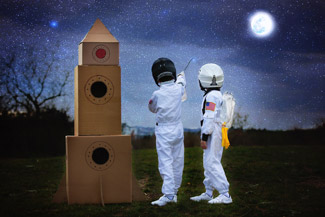 Reading this article will undoubtedly free certain readers of their guilt... There’s no denying it, all of us have caught ourselves daydreaming during a meeting at one time or another, right? Well, that may not necessarily be a bad thing! A study published in Neuropsychologia shows that having a wandering mind may actually be quite productive. What if the greatest daydreamers were also more efficient and creative than the rest of us?
Reading this article will undoubtedly free certain readers of their guilt... There’s no denying it, all of us have caught ourselves daydreaming during a meeting at one time or another, right? Well, that may not necessarily be a bad thing! A study published in Neuropsychologia shows that having a wandering mind may actually be quite productive. What if the greatest daydreamers were also more efficient and creative than the rest of us?While most of us spend part of our waking moments lost in thought, we accord little importance to this activity. According to J. Singer, a professor of psychology at Yale, we must distinguish two types of daydreaming that we experience at varying ...
Can sheep recognize Barack Obama?
 In addition to humans, we often discuss the cognitive capacities of ravens and chimpanzees in our newsletters. Well for this newsletter, we thought it was high time to take a look at sheep! A research team at Cambridge University (England) recently tested sheep’s ability to recognize famous human faces using photographs. Were the sheep able to identify Emma Watson and Barack Obama?
In addition to humans, we often discuss the cognitive capacities of ravens and chimpanzees in our newsletters. Well for this newsletter, we thought it was high time to take a look at sheep! A research team at Cambridge University (England) recently tested sheep’s ability to recognize famous human faces using photographs. Were the sheep able to identify Emma Watson and Barack Obama?Several studies have shown that, just like rhesus macaques, horses, dogs, and mocking birds, sheep have the ability to recognize both other sheep as well as familiar human faces. Yet we knew very little about their overall ability to recognize faces. To learn more, researchers from the Departments of ...
Can happy music make you more creative?
 For years, research in neuroscience and psychology has shown the virtues of music for the brain, particularly in terms of memory, attention, and learning. A recent study, conducted jointly in the Netherlands and Australia looked into the positive effect of happy music on people's creative potential. What if listening to a piece of joyful music could help us find innovative and original solutions?
For years, research in neuroscience and psychology has shown the virtues of music for the brain, particularly in terms of memory, attention, and learning. A recent study, conducted jointly in the Netherlands and Australia looked into the positive effect of happy music on people's creative potential. What if listening to a piece of joyful music could help us find innovative and original solutions?As Simone Ritter (Radboud University, the Netherlands) and Sam Ferguson (University of Sydney, Australia) point out: “Creativity can be considered one of the key competencies for the twenty-first century.” So it seems important for us to be able to study how to foster and improve it. ...
How can we get a better look at how babies brains work?
 Until now, if you wanted to study how babies' brains functioned and developed, there was no alternative to magnetic resonance imaging. Unfortunately, putting babies in an MRI machine and keeping them still isn’t exactly easy. But a French team has just developed a new ultrasound neuroimaging technique. How is this scientific innovation going to revolutionize the way we observe babies’ neuronal activity?
Until now, if you wanted to study how babies' brains functioned and developed, there was no alternative to magnetic resonance imaging. Unfortunately, putting babies in an MRI machine and keeping them still isn’t exactly easy. But a French team has just developed a new ultrasound neuroimaging technique. How is this scientific innovation going to revolutionize the way we observe babies’ neuronal activity?Even today, apart from data from neuroimaging and electroencephalography (which doesn't produce functional images), "we're completely in the dark when it comes to brain activity and development in babies,” says Mickael Tanter (who led the research team). Moreover, with very ...
Is it possible to locate Christmas spirit in the brain?
 Holly, turkey, chocolates, presents, reindeer, snow… Ah the magic of Christmas! But some people don’t enjoy this time of year and appear to be entirely lacking in "Christmas spirit." Until now, the phenomenon had escaped the scientific radar. But Danish researchers decided to conduct a (both serious and facetious) study to detect the "Magic of Christmas" in the human brain. What happens in the brains of Christmas addicts?
Holly, turkey, chocolates, presents, reindeer, snow… Ah the magic of Christmas! But some people don’t enjoy this time of year and appear to be entirely lacking in "Christmas spirit." Until now, the phenomenon had escaped the scientific radar. But Danish researchers decided to conduct a (both serious and facetious) study to detect the "Magic of Christmas" in the human brain. What happens in the brains of Christmas addicts?In order to locate “Christmas spirit" in the brain, researchers from the Departments of Neurology and Clinical Physiology, and Nuclear Medicine (University of Copenhagen, Denmark) compared a group of 10 people (8 men and 2 women) that had been celebrating ...
Can a chimpanzee learn to play rock-paper-scissors?
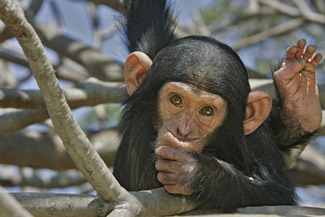 After watching all of the Planet of the Apes films, we noticed something disturbing: we never see primates playing rock-paper-scissors! And yet, they’re perfectly capable of playing. A recent study carried out by the University of Kyoto (Japan) and Beijing (China) shows that chimpanzees can learn to play this game and master it as well as a four year-old child. Read on to learn more about this discovery.
After watching all of the Planet of the Apes films, we noticed something disturbing: we never see primates playing rock-paper-scissors! And yet, they’re perfectly capable of playing. A recent study carried out by the University of Kyoto (Japan) and Beijing (China) shows that chimpanzees can learn to play this game and master it as well as a four year-old child. Read on to learn more about this discovery.The study, published in the journal Primates, aimed to determine whether chimpanzees could learn and master a "transverse" task. Rock-paper-scissors is the perfect game because it implements so-called circular relationships between three elements: the flat hand (paper) covers ...
How can a big scare lead to nightmares?
 Have you ever had a nightmare after experiencing a particularly frightening event during the day? Researchers from the New York University Neuroscience Institute studied the mechanisms behind this process of emotional memory reactivation. In their experiment, they exposed rats to a harmless experience with the help of a keyboard cleaner. So why do we have nightmares after experiencing a frightening situation?
Have you ever had a nightmare after experiencing a particularly frightening event during the day? Researchers from the New York University Neuroscience Institute studied the mechanisms behind this process of emotional memory reactivation. In their experiment, they exposed rats to a harmless experience with the help of a keyboard cleaner. So why do we have nightmares after experiencing a frightening situation? Just like humans, rats also store what are known as cognitive maps. The term was introduced in 1948 by E.C. Tolman who argued that rodents didn't just learn responses (turn right or left, go up or down), but were capable of building mental maps of their environment; in other ...
Is face recognition innate?
 In humans and primates, the ability to recognize faces has long been considered to be innate. This means that, from birth, the brain is “naturally” able to identify faces. But this innate view has been called into question by a recent study carried out by Harvard Medical School and published in Nature Neuroscience. What if facial recognition was actually a product of experience?
In humans and primates, the ability to recognize faces has long been considered to be innate. This means that, from birth, the brain is “naturally” able to identify faces. But this innate view has been called into question by a recent study carried out by Harvard Medical School and published in Nature Neuroscience. What if facial recognition was actually a product of experience?Studies on primate brain development indicate that the clusters of neurons responsible for facial recognition develop in the superior temporal sulcus at about 200 days. The region appears in various species of primates as well as humans. To better understand how the ability to recognize faces ...
Why is dancing good for the brain?
 As dictated by the eternal David Bowie, “Let’s Dance." And he’s right to encourage us to practice this art that’s not only good for the body… but also for the brain. Indeed, a recent study carried out by a German team of scientists has recently shown the benefits of dance on mental health, particularly in the elderly. And you don’t have to be a terrific dancer to enjoy the benefits! Why is dancing so good for our brains?
As dictated by the eternal David Bowie, “Let’s Dance." And he’s right to encourage us to practice this art that’s not only good for the body… but also for the brain. Indeed, a recent study carried out by a German team of scientists has recently shown the benefits of dance on mental health, particularly in the elderly. And you don’t have to be a terrific dancer to enjoy the benefits! Why is dancing so good for our brains? For their longitudinal study published in Frontiers in Human Neuroscience, the scientists examined the effects of regular dance practice on brain structure and function along with motor and cognitive performance and compared them with ...
Can ravens plan?
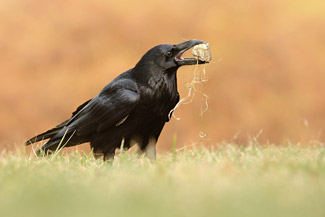 Grabbing an umbrella as we walk out the door demands a type of planning that requires us to be able to remove ourselves from the current situation (it’s not raining right now…) To project into the future (...but it might rain). This is based on elaborate cognitive skills that, up until now, were thought to only exist in humans and great apes. But a new study shows that ravens may also be capable of organizing by thinking about the future. How did the scientists make this surprising discovery?
Grabbing an umbrella as we walk out the door demands a type of planning that requires us to be able to remove ourselves from the current situation (it’s not raining right now…) To project into the future (...but it might rain). This is based on elaborate cognitive skills that, up until now, were thought to only exist in humans and great apes. But a new study shows that ravens may also be capable of organizing by thinking about the future. How did the scientists make this surprising discovery?Whether preparing dinner or a business plan, planning involves anticipating events and making decisions based on this "analysis." While this ability is specific to humans, several studies ...
Why do certain songs give us the chills?
 Personally, I get the chills every time I hear One by U2 or (in a totally different genre) Nessun Dorma sung by Pavarotti. Do you ever get goose bumps when listening to a piece of music? If you do, your brain may be "unique." Indeed, a recent study carried out by the University of Southern California indicates that people who vibrate in unison with music may have an increased capacity for feeling intense emotions. How does music affect the brain?
Personally, I get the chills every time I hear One by U2 or (in a totally different genre) Nessun Dorma sung by Pavarotti. Do you ever get goose bumps when listening to a piece of music? If you do, your brain may be "unique." Indeed, a recent study carried out by the University of Southern California indicates that people who vibrate in unison with music may have an increased capacity for feeling intense emotions. How does music affect the brain?As a prelude to their research, Matthew Sachs and his colleagues at the Brain & Creativity Institute remind us that the emotions provoked by an esthetic piece of work activate the same reward network in the brain that responds to the ...
Are questions with gestures more effective?
 While gestures vary between individuals and cultures, it's natural to gesticulate while speaking. More and more studies are looking into how these non-verbal signals affect our understanding. Do gestures facilitate or hinder comprehension? To shed light on the matter, a new Dutch study aims to demonstrate the positive effects of gestures when asking someone a question. How can adding gestures to a question make the interaction more effective?
While gestures vary between individuals and cultures, it's natural to gesticulate while speaking. More and more studies are looking into how these non-verbal signals affect our understanding. Do gestures facilitate or hinder comprehension? To shed light on the matter, a new Dutch study aims to demonstrate the positive effects of gestures when asking someone a question. How can adding gestures to a question make the interaction more effective? Oral communication is multimodal; it simultaneously solicits several semiotic systems: verbal (all of the areas related to “language": phonological, lexical, morphosyntactic, etc.), but also non-verbal (kinesics and proxemics) and ...
Is expensive wine really better?
 Quality undoubtedly comes at a price. But we also know that prices can influence our perception of a product. Studies have shown that the same product can be perceived differently depending on its price. This is called the “marketing placebo effect.” A new study published in Scientific Reports explains the role played by the brain in these sorts of price biases. How can the same person judge the same wine differently simply by changing the price?
Quality undoubtedly comes at a price. But we also know that prices can influence our perception of a product. Studies have shown that the same product can be perceived differently depending on its price. This is called the “marketing placebo effect.” A new study published in Scientific Reports explains the role played by the brain in these sorts of price biases. How can the same person judge the same wine differently simply by changing the price? Previous work carried out by the Franco-German research team (the Cognitive Neuroscience Laboratory / Economic Decision-Making group in Paris and the Center for Economics and Neuroscience in Bonn) showed that the price of a product ...
Does being bilingual increase your brain capacity?
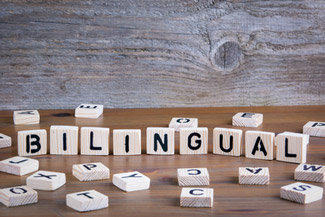 Over the past several years, J.M. Annoni, a neurologist and professor at the University of Friborg (Switzerland), has conducted studies on the effects of bilingualism on the brain. In an interview published in the Swiss journal Le Matin, the specialist in language development shed light on the impact of second language acquisition and learning on the brain. How is the brain able to manage two (or more) languages?
Over the past several years, J.M. Annoni, a neurologist and professor at the University of Friborg (Switzerland), has conducted studies on the effects of bilingualism on the brain. In an interview published in the Swiss journal Le Matin, the specialist in language development shed light on the impact of second language acquisition and learning on the brain. How is the brain able to manage two (or more) languages?The studies carried out by J.M. Annoni show just how flexible our brain can be, choosing between different strategies according to the context in which it is solicited. For example, a perfectly bilingual individual will tend to develop two ocular “reading modes” ...
Can seeds decide for themselves when to sprout?
 It’s generally accepted that seed germination is based on external factors such as humidity, temperature, and light. The chemical reactions caused by these stimuli affect the length of seed dormancy. But what if the seed itself decided when the time was right for germination? A study published in The Proceedings of the National Academy of Sciences (PNAS) tells us more about this possibility, implying that plants may have "brains."
It’s generally accepted that seed germination is based on external factors such as humidity, temperature, and light. The chemical reactions caused by these stimuli affect the length of seed dormancy. But what if the seed itself decided when the time was right for germination? A study published in The Proceedings of the National Academy of Sciences (PNAS) tells us more about this possibility, implying that plants may have "brains."The research team, composed of researchers from the School of Biosciences (University of Birmingham, United Kingdom) and the Department of Cell and Systems Biology (University of Toronto, Canada), wanted to better understand the mechanisms used by the ...
Does being generous make us happier?
 Be generous, it will make you happy! This could be the conclusion of a study carried out by an international team of neurobiologists from the universities of Lübeck (Germany), Chicago (United States), and Zurich (Switzerland). Using magnetic resonance imaging (MRI), the researchers discovered a neural link between generosity and happiness. How were they able to isolate this relationship in the brain?
Be generous, it will make you happy! This could be the conclusion of a study carried out by an international team of neurobiologists from the universities of Lübeck (Germany), Chicago (United States), and Zurich (Switzerland). Using magnetic resonance imaging (MRI), the researchers discovered a neural link between generosity and happiness. How were they able to isolate this relationship in the brain?Among the studies seeking to uncover the motives for generous behavior, it’s undoubtedly those in psychology that, since the year 2000, have put forward the most interesting hypothesis: what if altruism and generosity made us happy? While the positive emotion induced by generous ...
Right eye or left eye? Which do you prefer?
 “Beauty is in the eye of the beholder,” as the saying goes. Who would have thought this old proverb could be so true? Imagine you’re about to gaze upon a famous painting. Which eye would you use? Except for those of us who are ambidextrous, each of us is either right or left-handed. But this form of laterality doesn’t just apply to our hands and feet, it’s also true for the eyes. Why do we have a dominant eye?
“Beauty is in the eye of the beholder,” as the saying goes. Who would have thought this old proverb could be so true? Imagine you’re about to gaze upon a famous painting. Which eye would you use? Except for those of us who are ambidextrous, each of us is either right or left-handed. But this form of laterality doesn’t just apply to our hands and feet, it’s also true for the eyes. Why do we have a dominant eye? Unless you practice archery or another precision sport, or if you’ve ever needed to look through a keyhole, it's unlikely you're aware of which eye is dominant. But if you have a tendency to favor your right hand or right foot in various activities, the same is ...
Can words influence pupil dilation?
 We know that our pupils dilate (mydriasis) and contract (mycosis) depending on ambient light and our mood. A recent study conducted by researchers at Aix-Marseille University’s laboratories of Cognitive Psychology, and Speech and Language, along with the University of Groningen (Netherlands) shows that the meaning of a word also influences the size of our pupils. How can a word trigger pupil dilation or contraction?
We know that our pupils dilate (mydriasis) and contract (mycosis) depending on ambient light and our mood. A recent study conducted by researchers at Aix-Marseille University’s laboratories of Cognitive Psychology, and Speech and Language, along with the University of Groningen (Netherlands) shows that the meaning of a word also influences the size of our pupils. How can a word trigger pupil dilation or contraction?
During the 70s, Eckward Hess, a pioneer in pupillometry (and former head of the psychology department at the University of Chicago) observed that, in general, pupil size increases when a person observes something or someone "stimulating." Ads for cosmetics have ...
Do ravens hold a grudge?
 Many studies have already demonstrated the intellectual abilities of corvids, such as crows, magpies, and ravens. A scientific team from the University of Vienna (Austria) and the department of cognitive sciences at Lund University (Sweden) tested the memory capacities of crows. By subjecting them to a rather unusual experiment, the researchers discovered that ravens are rather spiteful creatures…
Many studies have already demonstrated the intellectual abilities of corvids, such as crows, magpies, and ravens. A scientific team from the University of Vienna (Austria) and the department of cognitive sciences at Lund University (Sweden) tested the memory capacities of crows. By subjecting them to a rather unusual experiment, the researchers discovered that ravens are rather spiteful creatures…
J.J.A. Müller and colleagues tested the memory of nine ravens in an exchange paradigm with humans (reciprocity). Laggie, Horst, Louise, Nobel, and the other ravens had the opportunity to exchange a low-quality food (bread) for a high-quality food (cheese); experiments have shown ...
Can spider venom protect your brain?
 Its name: Hadronyche infensa or the “Darling Downs funnel web spider” (the name of a vast farming area in Australia): a very toxic poisonous spider. But this creature may also have an unexpected virtue: protecting the brain from neural damage caused by a stroke. How did Australian researchers chance upon this discovery? Read on to find out more about this study published in PNAS.
Its name: Hadronyche infensa or the “Darling Downs funnel web spider” (the name of a vast farming area in Australia): a very toxic poisonous spider. But this creature may also have an unexpected virtue: protecting the brain from neural damage caused by a stroke. How did Australian researchers chance upon this discovery? Read on to find out more about this study published in PNAS.
One of the studies main authors, Professor Glenn King from the Institute for Molecular Bioscience at the University of Queensland (Australia) says, “We believe that we have, for the first time, found a way to minimize the effects of brain damage after a stroke.” These encouraging remarks are ...
Is GPS bad for your brain?
 For many people GPS is a beneficial form of technology. But letting yourself be guided vocally (or even just visually) by a GPS could actually be harmful to your brain in the long run. A study published in the review Nature Communication tells us why following the instructions given by a virtual guidance device could impair our brain’s orientation functions, e.g. our internal GPS.
For many people GPS is a beneficial form of technology. But letting yourself be guided vocally (or even just visually) by a GPS could actually be harmful to your brain in the long run. A study published in the review Nature Communication tells us why following the instructions given by a virtual guidance device could impair our brain’s orientation functions, e.g. our internal GPS.
It began in 2014 when a team of researchers (Edvard and May-Britt Moser, and John O’Keefe) shed light on the existence of a tracking and navigation system in the human brain. Their research showed that cells in the hippocampus helped animals to record spatial information in order to orient ...
How to become a memory athlete
 You’re undoubtedly already familiar with memory champions that are capable of easily memorizing tens, hundreds, or thousands of pieces of information (word, numbers, faces, etc.) A recent study published in Neuron shows that, from a cerebral point of view, they’re not really so different from the rest of us. And that with training we can also considerably increase our memorization abilities and even compete with these athletes!
You’re undoubtedly already familiar with memory champions that are capable of easily memorizing tens, hundreds, or thousands of pieces of information (word, numbers, faces, etc.) A recent study published in Neuron shows that, from a cerebral point of view, they’re not really so different from the rest of us. And that with training we can also considerably increase our memorization abilities and even compete with these athletes!
In order to better understand the brain features of people with highly developed memorization skills, the research team led by Martin Dresler (of the Radboud University Medical Center in the Netherlands) decided to study the 23 top participants in ...
Can an eye that's disconnected from the brain see?
 In regenerative medicine, in cases of transplantation or graft, innervation, or the supply of nerves to a body part, remains a major difficulty. This is particularly true for the sensory organs since they must be connected to the brain in order to communicate auditory, visual, and tactile information. But a recent study, carried out on tadpoles seems to indicate that it's possible to use the eye without it being directly connected to the brain.
In regenerative medicine, in cases of transplantation or graft, innervation, or the supply of nerves to a body part, remains a major difficulty. This is particularly true for the sensory organs since they must be connected to the brain in order to communicate auditory, visual, and tactile information. But a recent study, carried out on tadpoles seems to indicate that it's possible to use the eye without it being directly connected to the brain.
In a previous study, D.J. Blackiston, K. Vien and M. Levin succeeded in demonstrating that eyes grafted to the outside of the tadpole’s head were sensitive to light. However, visual tests were disappointing, since innervation failed ...
How does the brain of a believer function?
 People who have had a religious experience often describe feelings of joy, warmth and peace. The same feelings are associated with falling in love. However, the brain mechanisms of a believer remain unknown. The current study aimed to improve understanding of the neurobiology underlying spiritual and religious experiences. How does the brain of a believer function?
People who have had a religious experience often describe feelings of joy, warmth and peace. The same feelings are associated with falling in love. However, the brain mechanisms of a believer remain unknown. The current study aimed to improve understanding of the neurobiology underlying spiritual and religious experiences. How does the brain of a believer function?
Hypotheses about the neurobiology of a religious experience are conflicting. Discovering the neuroscience of religious experiences seems vital if we are to understand the motivation for religious behavior. The study undertaken by American researchers from the University of Utah and published in the review ...
Which social media platform is the most dangerous for our mental health?
 YouTube, Twitter, Facebook, Snapchat, Instagram. The five most popular social media platforms ranked in order from the least to the most harmful for teenage mental health. This classification was made following the results of a British study by The Royal Society for Public Health and the Young Mental Health Movement, published in May 2017. The study was carried out on 1500 young people aged 14 to 24, of whom 91% use the internet for social networking. So, what were the findings?
YouTube, Twitter, Facebook, Snapchat, Instagram. The five most popular social media platforms ranked in order from the least to the most harmful for teenage mental health. This classification was made following the results of a British study by The Royal Society for Public Health and the Young Mental Health Movement, published in May 2017. The study was carried out on 1500 young people aged 14 to 24, of whom 91% use the internet for social networking. So, what were the findings?
In the introduction to the study, Shirley Cramer (President of the Royal Society for Public Health) and Becky Inkster (Department of Neuroscience Cambridge University) remind us of the significance ...
Do creative people's brains look different?
 The implications of the “two-brain” theory (right hemisphere/left hemisphere) have already been explored; particularly their use in branding people’s strengths and flaws. Various research has highlighted the importance of connections between the two hemispheres and has demonstrated that our personality can't be explained by our use of one or the other. A new study supports this point of view by showing that creative people have better brain connections.
The implications of the “two-brain” theory (right hemisphere/left hemisphere) have already been explored; particularly their use in branding people’s strengths and flaws. Various research has highlighted the importance of connections between the two hemispheres and has demonstrated that our personality can't be explained by our use of one or the other. A new study supports this point of view by showing that creative people have better brain connections.
The research conducted by two statisticians is supported by a study on neuroanatomy and creativity previously carried out by R. Jung and colleagues at the University of New Mexico. Using a special MRI technique, the team ...
Using subliminal images to overcome phobias?
 What if arachnophobia could be overcome without the sufferer even realizing it? According to a study conducted by American researchers, ending one of our population’s most common phobias, a fear of spiders, could be achieved simply by exposing arachnophobes to subliminal images. Rather than putting them face-to-face with a tarantula, a subconscious exposure to photos might prove to be quite effective. How did the scientists make this surprising discovery?
What if arachnophobia could be overcome without the sufferer even realizing it? According to a study conducted by American researchers, ending one of our population’s most common phobias, a fear of spiders, could be achieved simply by exposing arachnophobes to subliminal images. Rather than putting them face-to-face with a tarantula, a subconscious exposure to photos might prove to be quite effective. How did the scientists make this surprising discovery?
Directed by Bradley S. Petersen (director of the Institute for the Developing Mind at Children's Hospital Los Angeles) and Paul Siegel (associate professor of psychology at NYU’s Purchase College), the team of researchers ...
Can we train bumblebees to score goals?
 For a many years, the capacity to manipulate objects with a specific goal in mind was ascribed to humans alone. However, research has shown that this type of behavior is also displayed by primates, marine mammals (dolphins), and birds (crows). Even more surprisingly, a team of scientists recently discovered that invertebrates, specifically bumblebees, also show this capacity. Discover how the bumblebee’s learning abilities have been tested.
For a many years, the capacity to manipulate objects with a specific goal in mind was ascribed to humans alone. However, research has shown that this type of behavior is also displayed by primates, marine mammals (dolphins), and birds (crows). Even more surprisingly, a team of scientists recently discovered that invertebrates, specifically bumblebees, also show this capacity. Discover how the bumblebee’s learning abilities have been tested.
The research was led by the department of biological science and experimental psychology at the Queen Mary University of London. It aimed to show that bumblebees could resolve a cognitive task which wasn’t part of their normal ...
Is the bilingual brain more efficient?
 Whether it happens early or late in life, the acquisition of two or more languages has been linked to improved cognitive flexibility. A team of researchers from Quebec chose to study the way in which bilingual and monolingual brains function while doing the Simon task, an exercise which involves neutralizing irrelevant secondary information to concentrate on the relevant information. How can bilingualism increase our capacity for multitasking?
Whether it happens early or late in life, the acquisition of two or more languages has been linked to improved cognitive flexibility. A team of researchers from Quebec chose to study the way in which bilingual and monolingual brains function while doing the Simon task, an exercise which involves neutralizing irrelevant secondary information to concentrate on the relevant information. How can bilingualism increase our capacity for multitasking?
Numerous studies have shown the advantages of being bilingual or multilingual, particularly in improving the functional efficiency of older people as well as reducing interferences from irrelevant stimuli in daily life. The Simon task ...
Ever heard of Disney therapy?
 In addition to the triumph of La La Land at this year's Oscars (even if it didn't make the final cut for "Best Film"), another film nominated in the "Best Documentary" category deserves some attention. The film tells the true story of Owen, a young boy suddenly struck by autism at the age of 3 who gradually regains normal functioning thanks to Walt Disney cartoons. It offers both a moving story and a message of hope.
In addition to the triumph of La La Land at this year's Oscars (even if it didn't make the final cut for "Best Film"), another film nominated in the "Best Documentary" category deserves some attention. The film tells the true story of Owen, a young boy suddenly struck by autism at the age of 3 who gradually regains normal functioning thanks to Walt Disney cartoons. It offers both a moving story and a message of hope.
Life, Animated is a documentary directed by Roger Ross Williams, adapted from the novel by Ron Suskind, Life, Animated: A Story of Sidekicks, Heroes, and Autism. The author, a well-known American journalist and winner of a Pulitzer Prize, tells the story of how he ...
What effects do seasonal allergies have on the brain?
 Runny nose, watery eyes, itching: these are the most common symptoms of seasonal allergies. A recent study conducted jointly by the University and the Institute of Molecular Regenerative Medicine in Salzburg, Austria suggests they may cause more than just rhinitis and conjunctivitis; allergies may have a long-term effect on the brain, and particularly memory. For example, how can pollen affect the brain?
Runny nose, watery eyes, itching: these are the most common symptoms of seasonal allergies. A recent study conducted jointly by the University and the Institute of Molecular Regenerative Medicine in Salzburg, Austria suggests they may cause more than just rhinitis and conjunctivitis; allergies may have a long-term effect on the brain, and particularly memory. For example, how can pollen affect the brain?
Currently, few findings suggest that allergic reactions can affect cognitive function in humans, though some studies have indicated that people suffering from seasonal allergic rhinitis perform less well on cognitive tests and have a greater tendency to exhibit signs of ...
The man who saw twisted mouths
 Imagine you lived in a world where the faces of everyone you met had a "deformed" mouth. One man actually began experiencing this disturbing vision rather suddenly. This incredible clinical case was reported by ophthalmologists in eNeurologicalSci, a review published by the World Federation of Neurology. So what exactly was the patient suffering from?
Imagine you lived in a world where the faces of everyone you met had a "deformed" mouth. One man actually began experiencing this disturbing vision rather suddenly. This incredible clinical case was reported by ophthalmologists in eNeurologicalSci, a review published by the World Federation of Neurology. So what exactly was the patient suffering from?
The 62-year-old man visits his doctor with an unusual complaint: faces look deformed to him. More specifically, while the nose and eyes appear normal, another part of the face always looks twisted and enlarged: the mouth. He isn’t suffering from prosopagnosia (an inability to identify faces) and he can correctly identify ...
Does music make us more responsive?
 What if playing the guitar, piano or bass could improve your multisensory capacities and responsiveness? A study conducted by Simon P. Landry and François Champoux of the School of Speech Therapy and Audiology at the University of Montreal shows just this. These Canadian researchers studied the reactions of musicians and non-musicians in response to various types of sensory stimuli. Does playing an instrument improve sensory processing?
What if playing the guitar, piano or bass could improve your multisensory capacities and responsiveness? A study conducted by Simon P. Landry and François Champoux of the School of Speech Therapy and Audiology at the University of Montreal shows just this. These Canadian researchers studied the reactions of musicians and non-musicians in response to various types of sensory stimuli. Does playing an instrument improve sensory processing?
Numerous studies have suggested that musical training may improve the way in which our senses interact. In the present study, the scientists wanted to verify if, over the long run, this training could improve multisensory processes at the ...
Is machismo harmful to mental health... in men?
 What if the macho behavior of certain gentlemen actually affected their mental health? While the study led by Dr Y. Joel Wong from the University of Indiana at Bloomington may seem exaggerated, it does present some interesting findings. Indeed, using a meta-analysis of a number of studies on the topic, it establishes a link between male chauvinists and their state of mental health. So is being macho dangerous to psychological well-being?
What if the macho behavior of certain gentlemen actually affected their mental health? While the study led by Dr Y. Joel Wong from the University of Indiana at Bloomington may seem exaggerated, it does present some interesting findings. Indeed, using a meta-analysis of a number of studies on the topic, it establishes a link between male chauvinists and their state of mental health. So is being macho dangerous to psychological well-being?
To answer the question, the authors of the study, which appeared in Journal of Counseling Psychology, conducted a meta-analysis (78 studies were reviewed) examining research on 19,453 subjects. In order to better evaluate the influence of ...
Does our brain enjoy poetry?
 Shall I compare thee to a summer’s day? What if these verses by Shakespeare could unconsciously communicate with the human spirit? A team of researchers has recently demonstrated that people with no knowledge of Welsh poetry are implicitly capable of discerning whether a sentence follows certain poetic rules. Even before considering its literal meaning, are we instinctively capable of enjoying the musical properties of poetry?
Shall I compare thee to a summer’s day? What if these verses by Shakespeare could unconsciously communicate with the human spirit? A team of researchers has recently demonstrated that people with no knowledge of Welsh poetry are implicitly capable of discerning whether a sentence follows certain poetic rules. Even before considering its literal meaning, are we instinctively capable of enjoying the musical properties of poetry?
As an introduction to their work, Guillaume Thierry and his colleagues at the University of Bangor (United Kingdom) remind us that even in 1932, the poet T.S. Eliot maintained that “genuine poetry can communicate before it is understood.” This ...
Why is it sometimes difficult to look someone else in the eye?
 Have you ever noticed that when you are trying to find the right formulation or have a word at the tip of your tongue during a conversation, you often look away from the other person, as if it were to help you concentrate? Based on this observation, two researchers from the Cognitive Psychology Department at the University of Kyoto conducted a study to try to explain why we need to break eye contact in order to focus on what we’re trying to say. According to them, there’s a good scientific reason for this.
Have you ever noticed that when you are trying to find the right formulation or have a word at the tip of your tongue during a conversation, you often look away from the other person, as if it were to help you concentrate? Based on this observation, two researchers from the Cognitive Psychology Department at the University of Kyoto conducted a study to try to explain why we need to break eye contact in order to focus on what we’re trying to say. According to them, there’s a good scientific reason for this.
As noted by the authors, Shogo Kajimura and Michio Nomura: “Although eye contact and verbal processing appear independent, people frequently avert their eyes from ...
The threat of stereotyping: are girls better readers than boys?
 Do you think boys are better than girls at math? And that girls outperform boys when it comes to reading? Well it turns out that as a result of hearing these “beliefs,” both boys and girls start behaving as the stereotypes predict. This is what research conducted by Pascal Pansu and colleagues has come to show; “the threat of stereotype” contributes to gender differences favoring girls when it comes to reading.
Do you think boys are better than girls at math? And that girls outperform boys when it comes to reading? Well it turns out that as a result of hearing these “beliefs,” both boys and girls start behaving as the stereotypes predict. This is what research conducted by Pascal Pansu and colleagues has come to show; “the threat of stereotype” contributes to gender differences favoring girls when it comes to reading.
While the threat of stereotype in creating gender differences has already been demonstrated in mathematics (in favor of boys), it has never been demonstrated for reading. P. Pansu, from the University of Grenoble and his colleagues at the Universities of Aix ...
Who enjoys getting songs stuck in their heads?
 Imagine you spend the whole day with Old MacDonald stuck in your head. While it might not have been with this song in particular, we’ve all had the experience of having a song looping in our head that we can’t seem to get rid of. Researchers at Goldsmiths University studied the neuronal bases of this phenomenon, often called “earworm.” How does a melody become “sticky?”
Imagine you spend the whole day with Old MacDonald stuck in your head. While it might not have been with this song in particular, we’ve all had the experience of having a song looping in our head that we can’t seem to get rid of. Researchers at Goldsmiths University studied the neuronal bases of this phenomenon, often called “earworm.” How does a melody become “sticky?”
More formally known as “Involuntary Musical Imagery” (INMI), earworm happens spontaneously and without our conscious control. This cognitive phenomenon is very widespread and is generally triggered by recent exposure to the song in question, but can also be influenced by our mood. For some, INMI ...
Does the human brain change in space?
 Is French astronaut Thomas Pesquet’s brain the same on earth as it is aboard the international space station (ISS)? Though humans are subjected to significant sensorimotor changes during space flights, until now no studies had ever examined the effects of space travel on the structure of the human brain. But this is changing thanks to researchers at the University of Michigan who have recently published a first report on the structural brain changes in humans due to space travel. How does the human brain change in space?
Is French astronaut Thomas Pesquet’s brain the same on earth as it is aboard the international space station (ISS)? Though humans are subjected to significant sensorimotor changes during space flights, until now no studies had ever examined the effects of space travel on the structure of the human brain. But this is changing thanks to researchers at the University of Michigan who have recently published a first report on the structural brain changes in humans due to space travel. How does the human brain change in space?
For their study, a team led by V. Koppelmans used data from 27 astronauts, 13 of whom had spent 2 weeks in space (inside a shuttle) and 14 others who had ...
What if running could repair your brain?
 Physical activity is clearly beneficial to our cardiovascular and brain health; it can even improve motor and cognitive function in certain forms of neurodegenerative diseases. Still, the underlying mechanisms by which exercise prevents or protects against neurodegeneration remain poorly understood. But researchers at the Department of cellular and molecular medicine (University of Ottawa, Canada) were able to find out more, at least in mice. Does running promote brain repair?
Physical activity is clearly beneficial to our cardiovascular and brain health; it can even improve motor and cognitive function in certain forms of neurodegenerative diseases. Still, the underlying mechanisms by which exercise prevents or protects against neurodegeneration remain poorly understood. But researchers at the Department of cellular and molecular medicine (University of Ottawa, Canada) were able to find out more, at least in mice. Does running promote brain repair?
Among these many benefits, we know that physical exercise promotes neurogenesis (the production of new neurons). In addition, although their role in delaying neurodegeneration is not yet clear, nerve ...
Why do we speak "baby" to dogs?
 Have you ever noticed that when we speak to dogs, we often use a register very close to “baby talk?” While the reasons behind this “analogy” haven't been clearly determined, a study led by the ENES team (Sensorial Neuro-Ethology Team) provide some preliminary answers to the question: why do we use 'baby talk' with dogs?
Have you ever noticed that when we speak to dogs, we often use a register very close to “baby talk?” While the reasons behind this “analogy” haven't been clearly determined, a study led by the ENES team (Sensorial Neuro-Ethology Team) provide some preliminary answers to the question: why do we use 'baby talk' with dogs?
When adults speak to infants, they generally change intonation (a higher pitch), slow their speech, and articulate vowels. These characteristics of “baby talk” have the positive effect of maintaining the infant’s engagement and attention. Moreover, speaking to babies in this register has been shown to increase their brain activity. For thousands ...
How does the brain react to being tickled?
 Despite being the subject of research for the last fifteen years, tickling is still largely misunderstood and there is a certain mystery attached to this form of social contact. That’s why S .Ishiyama and M. Brecht, researchers at the Centre for Computational Neuroscience, Humboldt University Berlin, wanted to try to understand what happens in the brains of animals and humans when they are tickled. And to uncover part of the mystery of these cerebral mechanisms they started by… tickling rats!
Despite being the subject of research for the last fifteen years, tickling is still largely misunderstood and there is a certain mystery attached to this form of social contact. That’s why S .Ishiyama and M. Brecht, researchers at the Centre for Computational Neuroscience, Humboldt University Berlin, wanted to try to understand what happens in the brains of animals and humans when they are tickled. And to uncover part of the mystery of these cerebral mechanisms they started by… tickling rats!
Previous studies had shown that when rats are tickled they produce ultrasonic vocalization; in other words, they ‘laugh.’ These little cries of joy, inaudible to the human ear, ...
How long should a nap last?
 The benefits of napping are well known, however a new study led by Chinese researchers at the Sleep Center at John Hopkins University, Baltimore (USA), has re-established these benefits while providing further details on the ideal length of time for a nap. To really experience the cognitive benefits of napping, nap time should be neither too long nor too short. So, what is the ideal length of time?
The benefits of napping are well known, however a new study led by Chinese researchers at the Sleep Center at John Hopkins University, Baltimore (USA), has re-established these benefits while providing further details on the ideal length of time for a nap. To really experience the cognitive benefits of napping, nap time should be neither too long nor too short. So, what is the ideal length of time?
In this study, a team of researchers, led by Professor Junxin Li, questioned 2,974 Chinese people aged 65 years and over. Each person was asked (amongst other things) if they were used to taking an afternoon nap, and if so the average length of time. Then according to napping ...
How can our brains make us dishonest?
 Once a thief always a thief. Could this proverb be true from a neuroscientific perspective? According to a team of researchers in the Experimental Psychology Department at University College London, a neuronal mechanism could be the cause for the progressive learning of dishonesty. Their study shows that, through a snowball effect, small acts of cheating could result in more significant acts of dishonesty. How does our brain learn to be dishonest?
Once a thief always a thief. Could this proverb be true from a neuroscientific perspective? According to a team of researchers in the Experimental Psychology Department at University College London, a neuronal mechanism could be the cause for the progressive learning of dishonesty. Their study shows that, through a snowball effect, small acts of cheating could result in more significant acts of dishonesty. How does our brain learn to be dishonest?
Starting from the observation that many fraudulent acts begin as minor transgressions, Neil Garrett and colleagues attempted to empirically demonstrate this phenomenon of escalating dishonesty and explore the underlying neurological ...
Do dogs have personal memories?
 Human beings have the ability to remember events they’ve experienced (date, place, emotional state), a function fulfilled by episodic memory. A group of scientists of the Department of Ethology at the University Eötvös Loránd (Budapest, Hungry) wanted to know if dogs also shared this form of memory. But how can you prove that animals have personal memories without being able to "ask" them? The researchers found the solution: Do as I do.
Human beings have the ability to remember events they’ve experienced (date, place, emotional state), a function fulfilled by episodic memory. A group of scientists of the Department of Ethology at the University Eötvös Loránd (Budapest, Hungry) wanted to know if dogs also shared this form of memory. But how can you prove that animals have personal memories without being able to "ask" them? The researchers found the solution: Do as I do.
It may seem surprising that scientists thought it useful to prove that dogs can travel mentally in time and recall a specific event. Indeed, their behavior alone would seem to suggest that they possess this ability: for example a dog won't ...
How can we be moved by a work of art?
 Has a painting ever given you a wave of emotion? Have you ever had chills from listening to a piece of music? Jean-Pierre Changeux tries to explain why we answer yes to these questions in his book La Beauté dans le cerveau (The Beauty in the Brain, Odile Jacob). Interviewed in L'Obs, the neurobiologist reviews research in the field of “art neurosciences” on understanding aesthetic emotion. So what happens in our brains when we're presented with a work of art?
Has a painting ever given you a wave of emotion? Have you ever had chills from listening to a piece of music? Jean-Pierre Changeux tries to explain why we answer yes to these questions in his book La Beauté dans le cerveau (The Beauty in the Brain, Odile Jacob). Interviewed in L'Obs, the neurobiologist reviews research in the field of “art neurosciences” on understanding aesthetic emotion. So what happens in our brains when we're presented with a work of art?
The work of J.P. Changeux, an honorary professor at the Collège de France, is presented as a summary of twenty years of research, particularly on the neural mechanisms involved in aesthetic perception. When ...
Aversion to cheese: is the brain to blame?
 Cheese or dessert? For most of the French population, it's not an easy choice! But while France may be the country of cheese (boasting nearly 1,600 varieties), some of its inhabitants are disgusted by it. Researchers at the Neuroscience Research Center in Lyon and the Paris-Seine Neurosciences Laboratory wanted to understand this aversion. What they found is surprising… It appears that the brains of people disgusted by cheese work differently.
Cheese or dessert? For most of the French population, it's not an easy choice! But while France may be the country of cheese (boasting nearly 1,600 varieties), some of its inhabitants are disgusted by it. Researchers at the Neuroscience Research Center in Lyon and the Paris-Seine Neurosciences Laboratory wanted to understand this aversion. What they found is surprising… It appears that the brains of people disgusted by cheese work differently.
So why would researchers choose cheese in order to study the phenomenon of aversion? Intuitively, the researchers figured that a fair number of people hate cheese. So they carried out a study on a sample of 332 subjects (145 men ages ...
Why do young children prefer flawless heroes?
 Young children love Manichaean worlds where the lives of archetypal characters (real good and real evil) unfold and where doubts, temptations and cracks are forbidden. In stories, good guys should only do good and bad guys should only do evil. In a study published in Psychological Science, the authors explain the reasons behind this preference for perfect heroes; and much of the explanation comes from understanding brain development in children. To what extend does the brain play a role in how children perceive a character?
Young children love Manichaean worlds where the lives of archetypal characters (real good and real evil) unfold and where doubts, temptations and cracks are forbidden. In stories, good guys should only do good and bad guys should only do evil. In a study published in Psychological Science, the authors explain the reasons behind this preference for perfect heroes; and much of the explanation comes from understanding brain development in children. To what extend does the brain play a role in how children perceive a character?
Christina Starmans and Paul Bloom, researchers in the Department of Psychology at Yale wanted to study how children perceived inner moral conflicts. To do ...
Can a pinch of cinnamon stimulate your brain?
 Prized for its delicious scent, cinnamon holds a prominent place amongst spices with known health benefits. Rich in antioxidants, it is also known for its antispasmodic (also supports digestion), antiviral and antiseptic properties. After a recent American study, this natural spice can also boast positive effects on memory and brain plasticity among its many benefits. How did researchers reveal cinnamon's ability to boost memory capacity, promote learning, and limit cognitive decline?
Prized for its delicious scent, cinnamon holds a prominent place amongst spices with known health benefits. Rich in antioxidants, it is also known for its antispasmodic (also supports digestion), antiviral and antiseptic properties. After a recent American study, this natural spice can also boast positive effects on memory and brain plasticity among its many benefits. How did researchers reveal cinnamon's ability to boost memory capacity, promote learning, and limit cognitive decline?
To study the potential impact of cinnamon on the brain, researchers from Rush University and the Veterans Affairs Medical Center in Chicago tested rats by placing food at the exit to a maze. This ...
What can yawning tell us about the brain?
 Seven seconds: the average length of a human yawn. While you've probably never had the urge to time the ‘activity’ yourself, after reading this article, you may change your mind... Indeed, researchers from the psychology department at the New York State University at Oneonta had the absurd idea of comparing the length of yawns in different mammals. And they discovered a surprising connection to the brain… so what does yawning tell us?
Seven seconds: the average length of a human yawn. While you've probably never had the urge to time the ‘activity’ yourself, after reading this article, you may change your mind... Indeed, researchers from the psychology department at the New York State University at Oneonta had the absurd idea of comparing the length of yawns in different mammals. And they discovered a surprising connection to the brain… so what does yawning tell us?
A powerful opening of the jaw, inhalation, a brief period of intense muscular contraction and a passive closing of the jaw with a short exhalation. That’s the definition of a yawn. Although the purpose of yawning has never been clearly ...
Can primates help us better understand OCD?
 Check to make sure the front door is locked, look to see if your cell phone is in your purse, make sure the keys to the car are in your pocket, recheck the front door... We pay little attention to these daily micro-tasks, but some French researchers at the National Institute of Health and Medical Research (INSERM) wanted to understand them better by studying primate brains. What are the brain mechanisms used in these micro-checks?
Check to make sure the front door is locked, look to see if your cell phone is in your purse, make sure the keys to the car are in your pocket, recheck the front door... We pay little attention to these daily micro-tasks, but some French researchers at the National Institute of Health and Medical Research (INSERM) wanted to understand them better by studying primate brains. What are the brain mechanisms used in these micro-checks?
For the purposes of the study published in the journal Nature Communications, a group of researchers from the Stem Cell and Brain Institute (SBRI) attached electrodes to monkeys in order to record their brain activity. More precisely, Emmanuel Procyk ...
Is late retirement the secret to long life?
 While there’s much debate about retirement age, research conducted by Chenkai Wu, a doctoral student in public health at the University of Oregon has shown that pushing back retirement age could increase life expectancy. The researcher explained his work during an interview with Nicole Torres for the Harvard Business Review (HBR) in October 2016. Why would ‘late’ retirement have an impact on longevity?
While there’s much debate about retirement age, research conducted by Chenkai Wu, a doctoral student in public health at the University of Oregon has shown that pushing back retirement age could increase life expectancy. The researcher explained his work during an interview with Nicole Torres for the Harvard Business Review (HBR) in October 2016. Why would ‘late’ retirement have an impact on longevity?
Working with professors Robert Stawski and Michelle Odden (University of Oregon), along with Gwenith Fisher (University of Colorado), C. Wu based his research on a longitudinal study (carried out between 1992 and 2010) on health and retirement. The study evaluated 2,956 ...
How does hypnosis affect the brain?
 You are getting sleepy, very sleepy… Besides these ‘entertaining,' spectacular, and often funny (but equally frightening) aspects, hypnosis is also a real medical approach used to reduce pain or as a cure for phobias. But hypnosis remains an enigma. A study published in the British review Cerebral Cortex is helping to uncover part of the mystery. So what happens in the brain during hypnosis?
You are getting sleepy, very sleepy… Besides these ‘entertaining,' spectacular, and often funny (but equally frightening) aspects, hypnosis is also a real medical approach used to reduce pain or as a cure for phobias. But hypnosis remains an enigma. A study published in the British review Cerebral Cortex is helping to uncover part of the mystery. So what happens in the brain during hypnosis?
For their study, researchers from Stanford first gave a test to 545 students and then selected 57 for further experimentation. Among them, 36 were considered to be easily hypnotizable, while the others (n=21) were considered to be insensitive to hypnosis. According to psychologist and ...
A new map of the brain unveiled
 Until today, 83 brain areas had been identified. You can now double this number because we’ve just discovered 97 others! It goes to show that the brain hasn’t finished revealing all of its mysteries. Scientists have taken yet another step toward understanding its complexity. The new map of the brain has just been published in Nature. How did researchers come upon this major neurobiological discovery?
Until today, 83 brain areas had been identified. You can now double this number because we’ve just discovered 97 others! It goes to show that the brain hasn’t finished revealing all of its mysteries. Scientists have taken yet another step toward understanding its complexity. The new map of the brain has just been published in Nature. How did researchers come upon this major neurobiological discovery?
To develop this new brain map, the research team of neurologists, engineers and computer scientists used data from the Human Connectome Project, a huge program in which highly sophisticated scanners recorded the brain activity of 1200 participants. With this partnership, the ...
How do you explain a false scare?
 You’re calmly walking along in the forest and all of the sudden you jump and scream at the sight of a snake... that is actually only a stick. It’s this type of split-second reaction that an international team of scientists wanted to study, under the hypothesis that the fear response could be activated in our brains even before we’re aware of what triggered it. What happens in our heads? Let’s find out.
You’re calmly walking along in the forest and all of the sudden you jump and scream at the sight of a snake... that is actually only a stick. It’s this type of split-second reaction that an international team of scientists wanted to study, under the hypothesis that the fear response could be activated in our brains even before we’re aware of what triggered it. What happens in our heads? Let’s find out.
To explain the “false scare,” neurobiologist Constantino Méndez-Bértolo and colleagues from the universities of Madrid and Geneva (the study was directed by researchers at the Campus de Excelencia Internaciol Moncloa) hypothesized (on the basis of a previous study ...
How do horses communicate with humans?
 Just as dogs can attract our attention to direct us to their empty food bowl, horses can also look to humans when they have a “problem,” as if to request our help. Rachel Malavasi and Ludwig Huber decided to find out more about “referential heterospecific communication” in domestic horses; that is, their capacity to communicate information about their environment. How do horses try to talk to us? To find out more read on.
Just as dogs can attract our attention to direct us to their empty food bowl, horses can also look to humans when they have a “problem,” as if to request our help. Rachel Malavasi and Ludwig Huber decided to find out more about “referential heterospecific communication” in domestic horses; that is, their capacity to communicate information about their environment. How do horses try to talk to us? To find out more read on.
This research was jointly led by a cognitive researcher at the Study Center for Ethical Equitation, Moncigoli Di Fivizzano, Italy, and a professor at the University of Veterinary Medicine of Vienna, Austria. The results were published in the review ...
When your right hand doesn't agree with your left…
 blocking the movement and forcing you to turn right! This was a frustrating reality for one atypical patient whose case was presented in the online review Frontiers in Human Neuroscience. The patient, who was followed by a medical team in Marseille, was suffering from diagonistic dyspraxia or a conflict between his right and his left hand. But what made his case unique?
blocking the movement and forcing you to turn right! This was a frustrating reality for one atypical patient whose case was presented in the online review Frontiers in Human Neuroscience. The patient, who was followed by a medical team in Marseille, was suffering from diagonistic dyspraxia or a conflict between his right and his left hand. But what made his case unique?
These types of behavior, also known as ‘diagonistics’, are principally observed in epileptic patients who have undergone surgery to sever the corpus callosum either partially or completely. This operation is usually used to treat refractory epilepsy by stopping interference between the left and the ...
How a baby's cry affects the adult brain
 When a baby cries we react quickly to the needs of the child. A team of researchers from the University of Toronto and the National Institute for child health and human development (Maryland) studied the effects of infant vocalizations on adult cognitive performance. What happens to the brain when a new born baby laughs or cries?
When a baby cries we react quickly to the needs of the child. A team of researchers from the University of Toronto and the National Institute for child health and human development (Maryland) studied the effects of infant vocalizations on adult cognitive performance. What happens to the brain when a new born baby laughs or cries?
While the majority of publications have emphasized the role of the baby’s face as a powerful means of attracting adult attention, the sounds of a baby’s cry are also significant. The acoustics of a baby’s cry trigger vigilance, and research on brain imagery shows that infant vocalizations activate cortical regions affecting cognitive control ...
Who wants new neurons?
 It’s the beginning of a new school year and time to make some new resolutions, so we wanted to share with you the major principles behind enhancing neuron growth. According to Professor Pierre-Marie Lledo, head of the department of neuroscience at the Pasteur Institute, we all have the capacity to enhance our neuron growth regardless of our age. Here are the six main rules stated during the colloquium S3 Odeon.
It’s the beginning of a new school year and time to make some new resolutions, so we wanted to share with you the major principles behind enhancing neuron growth. According to Professor Pierre-Marie Lledo, head of the department of neuroscience at the Pasteur Institute, we all have the capacity to enhance our neuron growth regardless of our age. Here are the six main rules stated during the colloquium S3 Odeon.
1. Avoid routine
New neurons are only produced when we try out new activities. Change is a stimulant for neurogenesis. Motivation, a motor for learning, stimulates and solicits the brain, which in turn forces stem cells to produce ...
Live a normal life with only 10 per cent of your brain?!
 While the astonishing case of a French man living a normal life despite having lost 90% of his brain was first reported in 2007 in the journal The Lancet, the story is resurfacing as part of the international conference of the Association for the Scientific Study of Consciousness. The portrait of this unusual subject was presented during the event, provoking new questions amongst the scientific community. How can a human lead a normal life with only 10% of his brain? The specialist Axel Cleeremans from the Université Libre de Bruxelles sheds light on the question.
While the astonishing case of a French man living a normal life despite having lost 90% of his brain was first reported in 2007 in the journal The Lancet, the story is resurfacing as part of the international conference of the Association for the Scientific Study of Consciousness. The portrait of this unusual subject was presented during the event, provoking new questions amongst the scientific community. How can a human lead a normal life with only 10% of his brain? The specialist Axel Cleeremans from the Université Libre de Bruxelles sheds light on the question.
Listening to Cleeremans paint the portrait of the patient during the conference held in June in Buenos Aires, one ...
Why are birds so smart?
 Scientists have long questioned the cognitive abilities of birds in relation to their tiny brain size; in certain areas they resemble or even outperform mammals. A new study carried out by researchers from the Universities of Prague, Vienna, and Rio de Janeiro has revealed how birds are able to perform such cognitive feats with brains the size of a walnut. What if Hitchcock were right?
Scientists have long questioned the cognitive abilities of birds in relation to their tiny brain size; in certain areas they resemble or even outperform mammals. A new study carried out by researchers from the Universities of Prague, Vienna, and Rio de Janeiro has revealed how birds are able to perform such cognitive feats with brains the size of a walnut. What if Hitchcock were right?
Among birds, corvids (crows, magpies, and jays for example) and parrots appear to be cognitively superior; they may even rival the great apes. They are able to make and use tools, understand cause and effect mechanisms (in both directions), recognize themselves in a mirror, plan for future ...
What do text messages do to our brain?
 New neurological evidence highlighting the dangers of texting while driving has recently been published in Epilepsy & Behavior. Scientists at the Mayo Clinic College of Medicine and the University of Florida have revealed a new dynamic in the brain that they’ve termed “texting rhythm.” What exactly is our brain doing as we’re writing an SMS?
New neurological evidence highlighting the dangers of texting while driving has recently been published in Epilepsy & Behavior. Scientists at the Mayo Clinic College of Medicine and the University of Florida have revealed a new dynamic in the brain that they’ve termed “texting rhythm.” What exactly is our brain doing as we’re writing an SMS?
To study how writing text messages impacts brain dynamics, the team of neuropathologists evaluated data from 129 patients (53 of whom suffered from seizures). The participants were monitored over a period of 16 months and were invited to perform different types of activities: sending SMS, performing cognitive, attention, and ...







